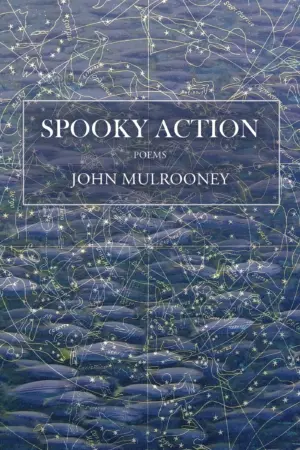Spooky Action
by John Mulrooney
reviewed by Michael Rich
Glowing taillights of cars idling by the Gloucester shoreline on New Year’s Eve open John Mulrooney’s Spooky Action, the first collection published by the fifty-seven-year-old. Gloucester’s drawbridge is raised, vehicles are stopped, and on the threshold of January, all is at a standstill. Away from holiday revelers, Mulrooney describes a devious and blundering humanity “underfoot / of strange angels,” isolated in automobiles, waiting. An uncertain future looms, while the past has already been spirited off like “lost luggage.” As Mulrooney writes in “Cantata for Mitrovica Stars”:
Your passport only
shuttles you between
never was and yet to be.
Spooky Action carries the burdens and insight of middle age: time devours all, and memory—always fallible—is no balm for the inevitability of facing oblivion. Meanwhile, in the treacherous narrows between past and future, the poet is tethered to former selves with nothing in common but a single body. His consistently deadpan tone throughout Spooky Action gives readers cause to proceed warily and with acutely engaged attention in order to parse his meaning. Yet readers suspect that Mulrooney’s irony—complicating and even undercutting his poems’ impact—serves to safeguard his own innate tenderness, to deny, if necessary, the sentiment encoded in the work.
The sentiment Mulrooney’s poems express frequently appears already voided by its own double—its own ironic nullification, doubled images, doubled identities. Sometimes their manifestation is fleeting and mundane: when automobile headlights sweep a passing train’s window, Mulrooney ponders the death of poet Gerrit Lansing commingling with their reflection. Other times, this doubleness is interior, emotional, and unsettlingly personal. In “Entanglement at Solstice,” Mulrooney writes:
so much of
your own life
scrawled into
something
unreadable
in a hand you
recognize is
no longer yours
The atmosphere of Spooky Action is dreamlike; one encounter smoothly and uncannily glides to the next. Turns of phrase turn and turn again, exhausting meaning as they unspool, only for the poem to reach an endpoint somehow reinscribed with more vital significance. Spooky Action conjoins waking and dream experiences, what Mulrooney refers to in “My Friend Wonders Why Irish Poets Write About Swans” as “all things the delighted eye sees / and all things the closed eye makes.” Although Mulrooney displays descriptive power throughout, the collection is distinguished by its syncopated music. The poetic lines often end on prepositions that propel the reader forward by rhythmic force, freeing the quasi-dreamscape from becoming an assemblage of static imagery.
In “Poem After Solstice,” Mulrooney addresses his own shifting attentions by suggesting it was only his infant self who could maintain “an impregnable embrace of the world,” since at that age he was able to “retain nothing.” An adult, encumbered in a way the infant is not, Mulrooney states he is incapable of weaving his observations into coherent narrative due to the wounds inflicted by memory that interrupt language. He states in “A Short Mute History of Locusts and Cicadas”:
because all I know of pattern
is the occasional, the elliptical, the scattered
that of which I cannot speak
which is nevertheless what I remember
Spooky Action falters when Mulrooney veers from the subjects which so evidently occupy him and instead writes occasional poems composed in other poets’ styles—such as “After Ange Mlinko”—which is to say Mulrooney is strongest when he speaks confidently in a voice that can only be his. The poems that address history are not well served when he ironically reduces tragic historical episodes to tropes severed from reality, as when he writes:
The Mongols wrote Les Fleurs du Mal in Sarajevo,
but I barely remember a thing about the Great War
Yet his “Cantata with Flight” succeeds by apparently eschewing irony, pairing documentary quotes with direct observation from Mulrooney’s work in the Middle East.
Ultimately, Mulrooney, aware of time’s swift passage, writes that his “speech is a drop of water / at the moment the ocean receives it.” In such a moment an entire life is lived; the struggle to remain oneself, contending against the world’s distractions and the inevitability of death, is the challenge. John Mulrooney, at fifty-seven, has met that challenge in his first collection. May there be more. As he writes in “Cantata After Bunting”:
You are a memory
god is trying to retrieve
and if you had a reason
you would help him
by remembering who you are.
Published on April 25, 2024

